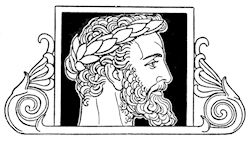Plus d'informations
8vo. 2 volumes in 1: (XVI),184 p.; (XVI),175,(1 blank) p. Vellum. 17 cm 'A double hoax' (Ref: Ad 1 & 2: Schweiger 2,725 & 2,821; Brunet 4,869; Graesse 5,239 & 5,441; Ebert 16523 & 17919; Smitskamp, 'The Scaliger Collection', no. 130; Schmeling/Stuckey no. 100. Not yet in VD18) (Details: Woodcut printer's device on the first title, depicting a flying Hermes strewing books over the earth from a cornucopia. Edges dyed red) (Condition: Vellum age-tanned. Brown stain on the lower board. Two ownership entries on the front flyleaf. Small stamp on the verso of the second title. Small ink annotation on the last free endpaper. A few faint and small ink annotations. Some foxing. Small capita numbers occasionally in the margins. A rust hole in the paper of the leaves *5 & *6) (Note: Ad 1: In 1658 a Jesuit scholar warned that the 'Satyricon', a comic novel of the Roman author Petronius, first century AD, was unsuitable reading for young christians. The Flemish Humanist Justus Lipsius 'famously branded Petronius an 'auctor purissimae impuritatis', 'author of the purest impurity''. (The Classical Tradition, Cambr. Mass., 2010, p. 706) Humanists were intrigued by the fragmentary nature of the surviving text and the sexual explicit episodes in the novel. In 1650 a large fragment of the Satyricon, the 'Cena Trimalchionis', was discovered. The discovery lent a significant impetus to the study of the 'Satyricon', and to the imagination of some scholars. The most successful hoax was a so-called 'complete version of the Satyricon published by François Nodot in 1691, supposedly based on a newly discovered manuscript from Belgrade'. (Idem. p. 707) (Alba Graeca is Belgrade) The text of this fraudulent hoax was reissued by Fritsch in this work of 1731. Ad 2: This title is an imitation, including the place and year of printing, of a Priapeia edition of 1664. It is, what Graesse calls a 'contrefaçon'. It was in fact published by Fleischer in Leipzig in 1731. The usual reference works for classics notice that the two works in this binding often come together. Many libraries and bibliographers did not notice the scam and erroneously described the 'contrefaçon' as published in 1664. § The Priapeia, or Priapea, is a collection of 85/90 erotic Latin poems composed to honour the ithyphallic Roman god of fertility and sexuality Priapus. The poems were composed by one or more anonymous poets, and collected in de first century A.D. They show a close relationship with Ovid and Martial. Erotic in content and witty in tone the poems are brilliant in style, versification and composition. The subject matter of the poems may be limited, the poets however make ingenious variations on the symbol of Priapus, his huge phallus, the thieves chastised with this rod, and the offerings for this god. The elegance of the seemingly effortless versification stirs the imagination of the reader, in spite of the limitations, the vulgar language and the colloquialisms. § The title page of this book does us want to belief that the commentary on these saucy poems was produced by the German scholar Kaspar Schoppe, or Gaspar Scioppius, or Schoppius, 1576-1649. Schoppe was a scholar of critical acumen and wide reading, but also shamelessly dishonest and vane. He converted to catholicism and 'distinguished himself by the virulence of his writings against the Protestants'. (Wikipedia, s.v. Caspar Schoppe) He had loads of enemies, among who the French classical scholar Joseph Justus Scaliger, formerly his intimate friend. 'His literary feuds earned him the title of the snarling scholar, the 'canis grammaticus'. (Sandys, 2,363) Another formerly intimate friend of Schoppe, the philologist and jurist Melchior Goldast, 1578-1635, played a dirty trick on him by publishing this Priapeia in 1606 in Frankfurt under his name. Schoppe and Goldast had been friends during their study at the protestant university of Altdorf. Schoppe was of course compromised by the book, for 'Europe's learned readers would now believe that he had really been poring over racy ancient poetry, gazing out his window at mating sparrows, his mind thoroughly occupied with pagan bawdry rather than Christan piety. (...) It was a thoroughly effective way to brand Schoppe as an eager consumer of pornography'. It is further assumed that the six letters concerning Cleopatra are also a product of Goldast's overheated imagination and humor. On the section title to the forged letters, page 117, Goldast reveals his name, where we read: 'in lucem prolatae ex Bibliotheca Melchioris Haiminsfeldii Goldasti'. Schoppe retaliated viciously upon this personal attack by his former friend in his 'Scaliger Hypobolimaeus' (Suppositious Scaliger) of 1607, where he reported 'that Goldast was dead, broken on the wheel as a convicted murderer'. And this story struck uncomfortably close to home, for Goldast's brother Sebastian had indeed been executed by this horrific means in Strasbourg in 1603, for killing a local woman. Informed that he had mistaken one Goldast brother for another (which he must have known all along), Schoppe seized the opportunity to add insult to injury by 'not giving up hope that one day (Melchior) would experience the same fate as his brother, and rot on high rather than underground'. ('Cleopatra: A Sphinx Revisited', edited by M.M. Miles, Berkeley 2011, p. 135/37. In this book a long discussion on the forged Cleopatra letters) Goldast was of course embarrassed, but he got his revenge, for the Priapeia and the name of the devout Schoppe have stuck together ever since, and did brand the Catholic apologist as a hypocrite and Pharisee for ever) (Provenance: on front flyleaf: 'Dr. Schwarz, Berlin C'; armorial stamp on the verso of the 2nd title: 'Ex libris Dr. Schwarz ICti'. (Iurisconsulti)) (Collation: )(8, A-L8, M4; *8, A-L8 (leaf L8 verso blank)) (Photographs on request)

